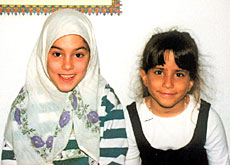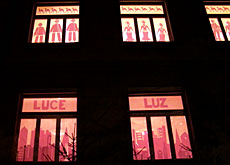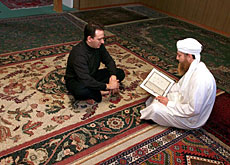Swiss teachers given guidance on Islam

A new handbook for German-speaking schools gives practical guidance on how to teach Muslim pupils, and foster religious tolerance in the classroom.
The book contains advice about the headscarf, taboos in Islam and how to help children feel included, and it offers pointers in improving inter-cultural dialogue while respecting Western laws and customs.
If during a meeting with parents, for example, a teacher has to point out their child’s lack of progress, he would be well-advised to start by saying something complimentary about the child: how sensitive she is or how good at games.
Parents are notoriously sensitive when it comes to their children, and will often refuse to accept a teacher’s judgement, if it questions the child’s ability. Naturally, such reactions are not confined to Muslim parents, but Islam can pose particular challenges to western teachers.
For instance, what do you say to a father who forbids his daughter from going on a school trip, or taking part in swimming lessons? How much should a teacher accommodate a parent’s objections to “normal” activities? Or, more broadly, to what extent should society expect immigrants to adapt to its customs?
As the book makes clear, it is important not to jump to conclusions. In some cases, a Muslim parent may refuse to let their child take part in an excursion simply because of concerns that the child will not have a room in which to pray.
Background and personality
“It is important that all children have the same opportunities,” says Nina Hössli, who edited the handbook. “There is no such thing as a ‘standard’ class: even in classes where there are no Muslims, each pupil has his or her unique background and personality.
“It is true that a minority group cannot be given special treatment, but it is important that Muslims be judged with respect, using a common yardstick, not on the basis of prejudice. For example: she wears a veil, she must be repressed, her parents must be fundamentalists, and so on.”
One example taken from the book – which was partly funded by the Swiss federal government – shows how, in dealing with a complex situation, the best approach is dialogue.
A father does not want his daughter to attend sex education lessons. The parents are invited to discuss the matter with the teacher. During the talk the father asks if he can see the teaching materials. He takes them home, discusses the matter with his wife, and then withdraws his objections.
Why did he change his mind? The answer is not that he was satisfied with the way the subject was presented, but rather that he – as head of the family – was entitled to make the decision, rather than simply having it imposed by the education authorities.
Taking control
Another example cited concerns children from rural areas, where the family structure is usually male-dominated.
Children from these families are not accustomed to taking instructions from women, particularly young women teachers who may lack confidence.
It is important for women primary school teachers to establish their authority at the outset. Failure to do so, or trying to be nice, can lead to misunderstandings and they may lose pupils’ respect, and not understand why.
Experience
The advice in the book comes from teachers and educators familiar with Islam and the problems of integration in German-speaking countries: Germany, Austria and Switzerland.
The book is in the form of a manual, and is indexed so teachers can easily find the topic that concerns them, whether it be the legal background or the daily practice of Islam and its more mystical aspects.
“We have had very positive feedback from teachers, who appreciate the handbook’s easily consultable format,” says Hössli.
In many cases, it helps to prevent misunderstandings with a minimum of effort. For example, some Muslims regard the spoken word as having more weight than its written equivalent.
If a father or mother fails to turn up at the parents’ evening, it may be simply because they did not understand the written invitation, or did not take it seriously.
swissinfo, Raffaella Rossello
Approximately 400,000 Muslims now live in Switzerland.
In many school classrooms they are now the largest non-Christian group.
Federal statistics give the following figures for religious affiliation in Switzerland (2000):
Catholics: 42 per cent
Protestants: 35 per cent
Atheists: 11 per cent
Muslims: 4.3 per cent
Jews: 0.2 per cent
The book’s 25-year-old editor, Nina Hössli, learned about Islam when working among Bosnian refugees.
She has also lived in Bosnia, in direct contact with the local people.
The contributors to the handbook, written for Swiss, German and Austrian teachers, include experts on Islam, teachers, educators and sociologists.
The book was produced by a team of seven people who worked together for three years on the issue of “Islamophobia” under the auspices of the NCBI (National Coalition Building Institute), a voluntary organisation that combats discrimination of various kinds in countries all over the world.

In compliance with the JTI standards
More: SWI swissinfo.ch certified by the Journalism Trust Initiative











You can find an overview of ongoing debates with our journalists here . Please join us!
If you want to start a conversation about a topic raised in this article or want to report factual errors, email us at english@swissinfo.ch.